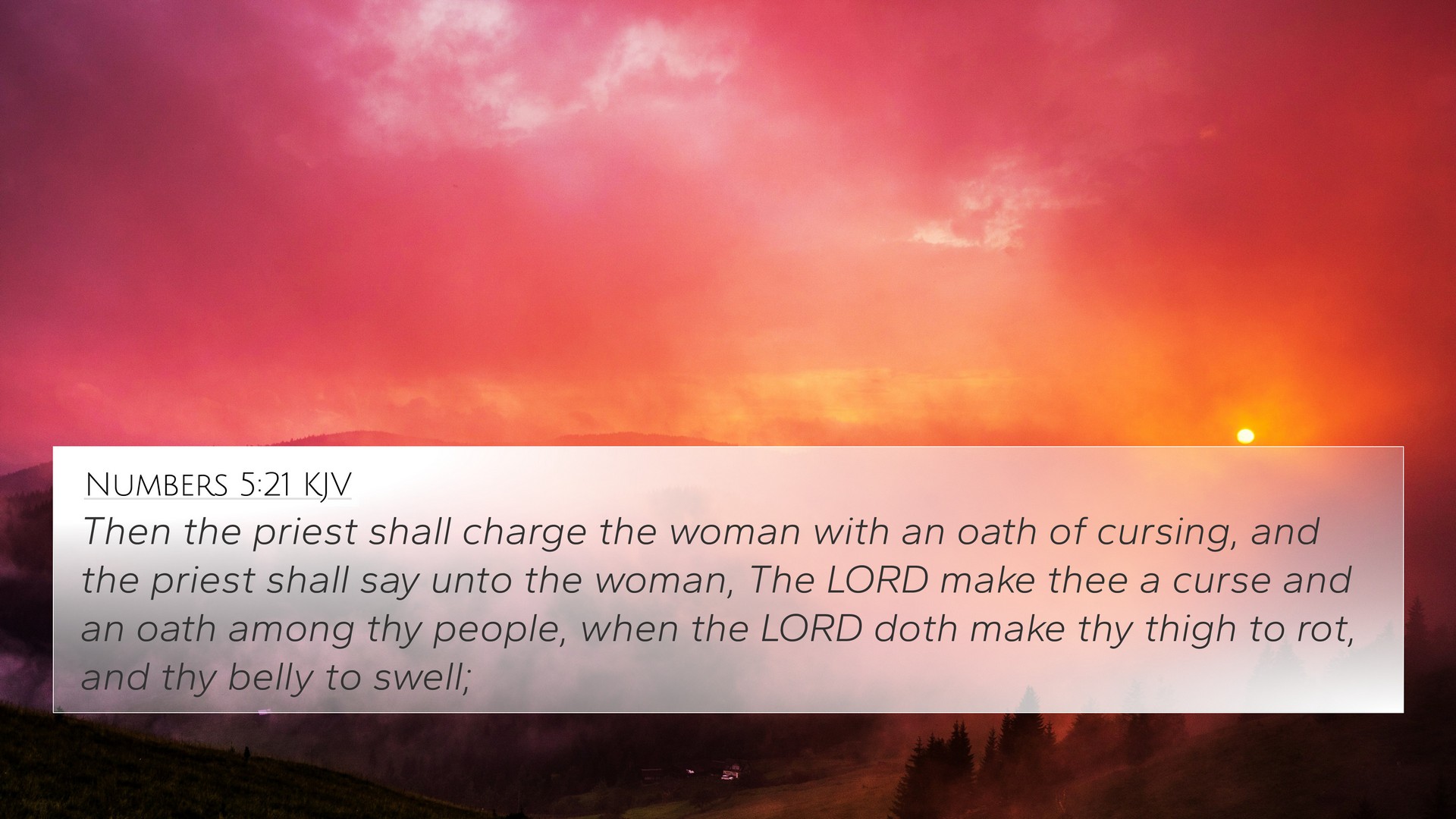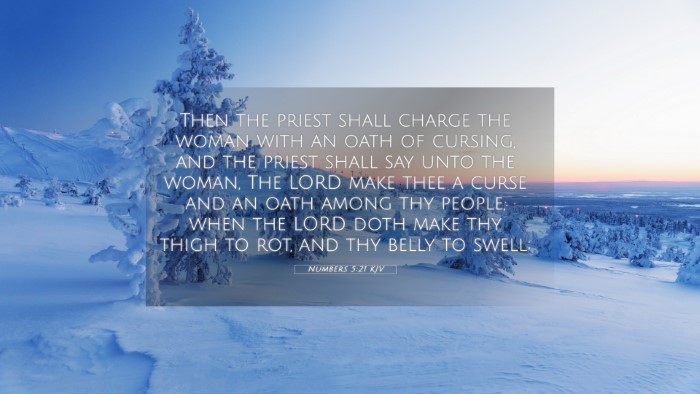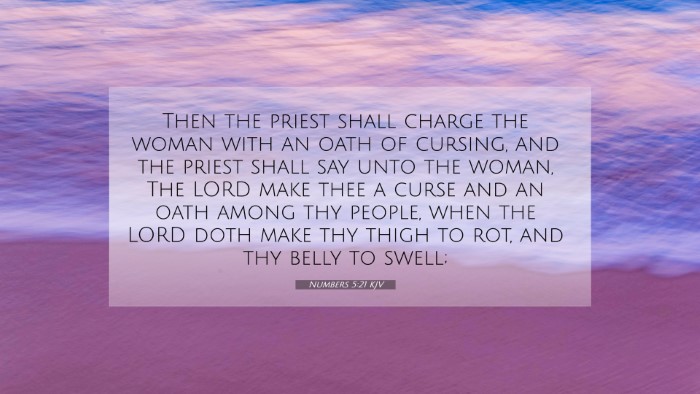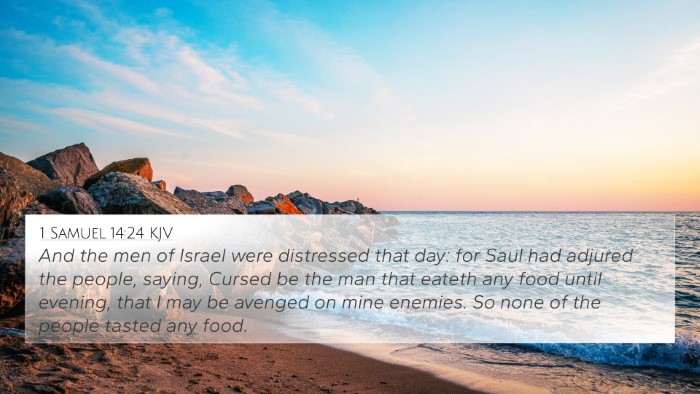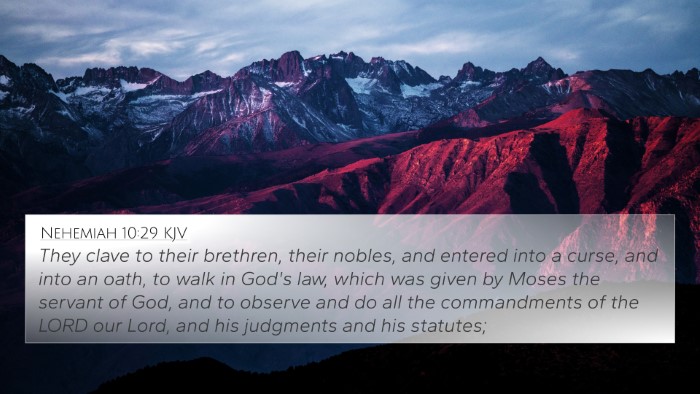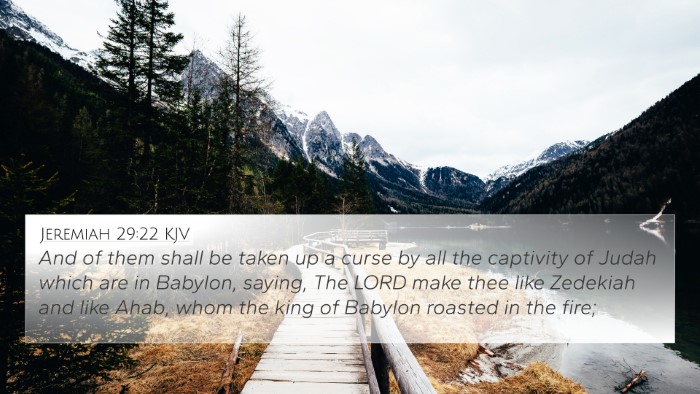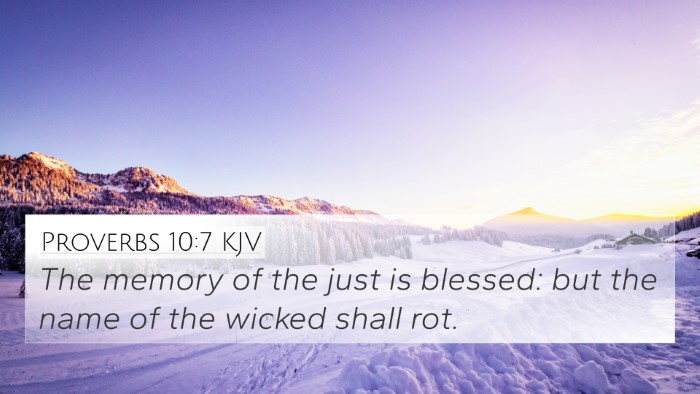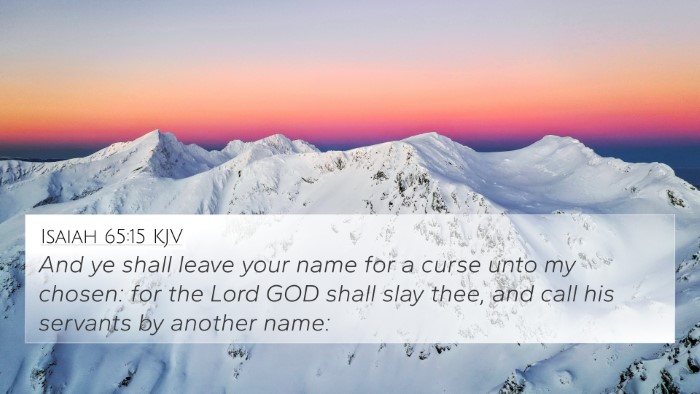Understanding Numbers 5:21
Numbers 5:21 reads:
"Then the priest shall put the woman under oath, and say to her, 'If no man has lain with you, and if you have not gone astray to uncleanness while under your husband’s authority, be free from this bitter water that brings a curse; but if you have gone astray and are defiled, then the bitter water that brings a curse will be your portion.'" (Numbers 5:21, NKJV)
This passage falls within the context of the law concerning a wife suspected of adultery. It is an integral part of the instructions given to the Israelites regarding purity, covenant fidelity, and the judicial process meant to address issues of marital unfaithfulness.
Commentary Insights
Overview of the Passage
Matthew Henry emphasizes the gravity of the situation where a woman is suspected of infidelity. The priest’s role is significant as they represent divine authority and must follow a process that reflects fairness and serious consideration for the woman’s dignity.
Albert Barnes notes the implications of the oath that serves to either vindicate the woman or reveal her guilt. The priest's words are pivotal, as they invoke God's judgment over the woman’s situation.
Adam Clarke elaborates on the cultural context, explaining that this ritual underscores the sanctity of marriage and the need for fidelity within it. The procedure is designed to establish truth amidst suspicion.
Significance of the Oath
The oath taken by the accused woman is central to this verse. It illustrates the seriousness of her marital commitment and the dire repercussions of unfaithfulness:
- Spiritual Accountability: The woman acknowledges a higher authority as the accusation is brought before God.
- Public Declaration: The public nature of such an oath served as a profound deterrent against infidelity.
- Covenantal Reflection: This ritual reflects the sacred nature of marital covenants in the eyes of God.
Bible Verse Cross-References
This verse can be linked to several other biblical passages, demonstrating thematic connections and the importance of fidelity, judgment, and cleansing:
- Exodus 20:14: "You shall not commit adultery." - Establishing God’s command against marital unfaithfulness.
- Leviticus 20:10: "If a man commits adultery with the wife of his neighbor, both the adulterer and the adulteress shall surely be put to death." - The brutal seriousness of the offense described in the law.
- Deuteronomy 22:22: "If a man is found lying with the wife of another man, both of them shall die." - The law as a deterrent against adultery.
- Proverbs 6:32: "He who commits adultery lacks sense; he who does it destroys himself." - Consequences on the personal life of the sinner.
- Jeremiah 3:8: "She saw that for all the adulteries of that faithless one, Israel, I had sent her away with a decree of divorce." - God’s stance towards spiritual unfaithfulness reflects human actions.
- John 8:4-5: "They said to Him, 'Teacher, this woman has been caught in the act of adultery. Now in the Law, Moses commanded us to stone such women.'" - Reflecting the continuation of the law concerning adultery into the New Testament.
- Matthew 19:9: "And I say to you: whoever divorces his wife, except for sexual immorality, and marries another, commits adultery." - Jesus reinforces the severity of marital unfaithfulness.
The Relationship Between the Old and New Testament
The cross-referencing of this verse with New Testament teachings provides an insightful dialogue about righteousness, grace, and the law. It exemplifies:
- Continuity of God’s Standards: Both the Old and New Testaments reveal God's unchanging standard for marital fidelity.
- Transformation in Christ: The New Testament addresses not just actions but the heart's intentions, illuminating deeper issues of faithfulness.
- Forgiveness and Restoration: New Covenant introduces mercy and redemption, highlighting a shift from strict punitive measures to the invitation of grace.
Tools and Methods for Bible Cross-Referencing
To navigate and explore the connections between this and other scripture effectively, various tools can aid in studying the Bible:
- Bible Concordance: An alphabetical listing that helps locate references within the text.
- Bible Cross-Reference Guide: Designed to link verses that share themes or contexts for deeper study.
- Cross-reference Bible Study Techniques: Approaches to enhance understanding through thematic exploration.
- Bible Reference Resources: Books and online materials offering comprehensive insights into scriptural connections.
Practical Application for Believers
The discussion surrounding Numbers 5:21 reveals deeper implications for contemporary believers:
- Integrity in Relationships: Upholding faithfulness in marriage and all relationships reflects God's nature.
- Judgment and Mercy: Understanding God’s judgment encourages humility while His mercy invites repentance.
- God’s Intent for Marriage: Examining scriptural teachings deepens appreciation for the divine design of marriage.
Conclusion
Numbers 5:21 encapsulates firm biblical instructions about fidelity and the holiness of marital commitments. As such, it serves as an important scriptural element for understanding both God's requirements and His graceful offer of reconciliation. Furthermore, this verse opens avenues for deep inter-Biblical dialogues and comparative analyses of fidelity, judgment, and mercy throughout Scripture.
